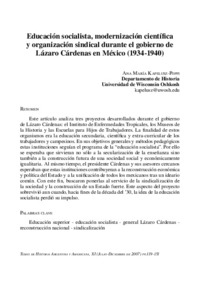Por favor, use este identificador para citar o enlazar este ítem:
https://repositorio.uca.edu.ar/handle/123456789/16260| Título: | Educación socialista, modernización científica y organización sindical durante el gobierno de Lázaro Cárdenas en México (1934-1940) | Autor: | Kapelusz Poppi, Ana María | Palabras clave: | EDUCACION SUPERIOR; EDUCACION SOCIALISTA; SINDICALISMO; MEXICO | Fecha de publicación: | 2007 | Editorial: | Pontificia Universidad Católica Argentina. Facultad de Filosofía y Letras. Departamento de Historia. Instituto de Historia Argentina y Americana | Cita: | Kapelusz-Poppi, A. M. Educación socialista, modernización científica y organización sindical durante el gobierno de Lázaro Cárdenas en México (1934-1940). [en línea]. Temas de Historia Argentina y Americana. 2007, 11. Disponible en: https://repositorio.uca.edu.ar/handle/123456789/16260 | Resumen: | Resumen: Este artículo analiza tres proyectos desarrollados durante el gobierno de Lázaro Cárdenas: el Instituto de Enfermedades Tropicales, los Museos de la Historia y las Escuelas para Hijos de Trabajadores. La finalidad de estos organismos era la educación secundaria, científi ca y extra-curricular de los trabajadores y campesinos. En sus objetivos generales y métodos pedagógicos estas instituciones seguían el programa de la “educación socialista”. Por ello se esperaba que sirvieran no sólo a la secularización de la enseñanza sino
también a la construcción futura de una sociedad social y económicamente igualitaria. Al mismo tiempo, el presidente Cárdenas y sus asesores cercanos esperaban que estas instituciones contribuyeran a la reconstrucción económica y política del Estado y a la unificación de todos los mexicanos tras un ideario
común. Con este fin, buscaron ponerlas al servicio de la sindicalización de la sociedad y la construcción de un Estado fuerte. Este aspecto del proyecto sobrevivió aun cuando, hacia fi nes de la década del ’30, la idea de la educación socialista perdió su impulso. Abstract: This articles examines three programs developed during the presidency of General Lázaro Cárdenas namely, the Instituto de Enfermedades Tropicales, the Museos de la Historia, and the Escuelas para Hijos de Trabajadores. The goal of these programs was to offer secondary and scientific education for the working class and the peasantry. They also included plans for bringing “cultura” to the Mexican people. With regards to their general goals and pedagogical methods, the three organisms followed the mandates of “socialist educaiton”. Therefore, it was expected that they were to contribute not only to the secularization of schools but also to the construction of an egalitarian society in the future. Finally, President Cárdenas and his close advisers also expected these institutes to be instrumental in the material and political reconstruction of the country and in the creation of a shared sense of nationhood. Therefore, the three institutes were geared towards the strengthening of the state and the creation of large unions and confederations. This aspect of the program survived even after the idea of socialist education lost its impetus, in the late 1930s. |
URI: | https://repositorio.uca.edu.ar/handle/123456789/16260 | ISSN: | 1666-8146 (impreso) 2618-1924 (online) |
Disciplina: | HISTORIA | Derechos: | Acceso abierto | Fuente: | Temas de Historia Argentina y Americana. 2007, 11 |
| Aparece en las colecciones: | TEM - 2007 nro. 11 |
Ficheros en este ítem:
| Fichero | Descripción | Tamaño | Formato | |
|---|---|---|---|---|
| educacion-socialista.pdf | 170,17 kB | Adobe PDF |  Visualizar/Abrir |
Visualizaciones de página(s)
222
comprobado en 27-abr-2024
Descarga(s)
1.350
comprobado en 27-abr-2024
Google ScholarTM
Ver en Google Scholar
Este ítem está sujeto a una Licencia Creative Commons

